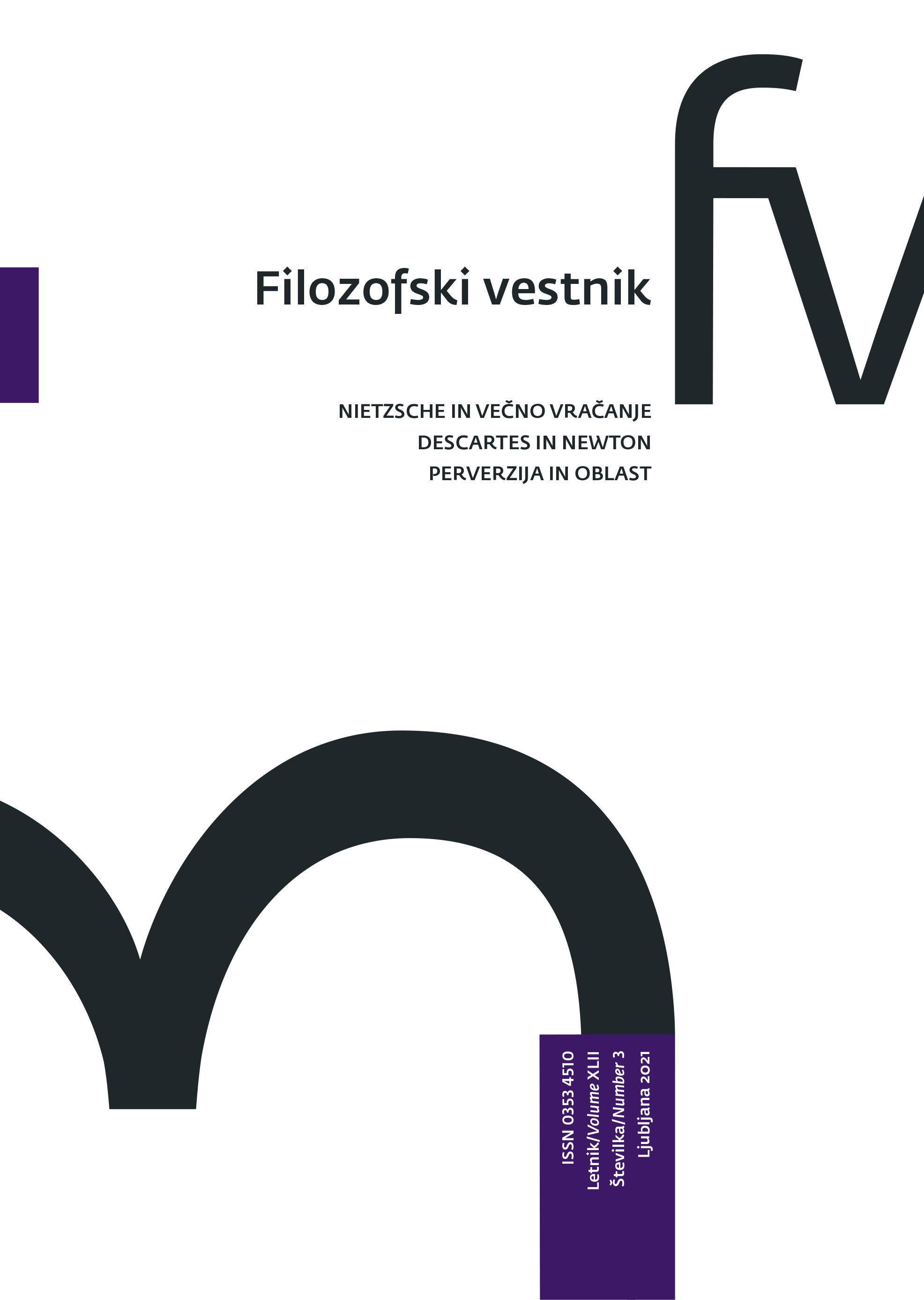The Thought of Eternal Recurrence in Nietzsche’s Notebook M III.
The Beginnings of the Doctrine and Traces of Its Silence
DOI:
https://doi.org/10.3986/fv.42.3.02Keywords:
Nietzsche, eternal recurrence, Notebook M III 1, EinverleibungAbstract
The article is primarily a study of Nietzsche’s unpublished fragments from the period spring-autumn 1881, in which Nietzsche first developed his thought of the “eternal recurrence of the same.” In the article, I attempt to accomplish two goals: the first goal is to explain Nietzsche’s theses on the eternal recurrence, which at that time were still remarkably clear and coherent. And the second goal is to try to find in these same theses an explanation for their future silence. In other words, the article examines the relationship between Nietzsche’s theses that he developed in 1881 and his book Thus spoke Zarathustra, which, in Nietzsche’s own words, relies on these theses as their “grounding thought,” but nevertheless never fully reveals them. Both lines of inquiry lead to the conclusion that the core of Nietzsche’s introduction of the idea of eternal recurrence is his concept of Einverleibung or embodiment. Indeed, the analysis shows that Nietzsche’s main concern with the thought of eternal recurrence was not to set forth its clear articulation within consciousness, but rather to construct it in such a way that it could become an unconscious instinct capable of gradually displacing the “embodied mistakes” that dominate our thinking from within itself.
Downloads
References
Bunta, Aleš, »Nietzsche: misel z ‘golobjimi nogami’«, Problemi, 56 (9-10/2018), str. 139–164.
Bunta, Aleš, »Govorica in izbrisani zakon večnega vračanja«, Problemi, 57 (7-8/2019), str. 31–57.
Deleuze, Gilles, Razlika in ponavljanje, prev. S. Tomšič, A. Žerjav, M. Jenko, S. Koncut, Ljubljana Založba ZRC, 2011.
Heidegger, Martin, Nietzsche, Volume III: Will to Power as knowledge; Volume IV: Nihilism, prev. J. Stambaugh, D. F. Krell, F. Capuzzi, San Francisco, Harper & Row, 1991.
Klossowski, Pierre, Nietzsche and the Vicious Circle, prev. D. W. Smith, London, Continuum, 2005.
Lincoln, Don, »What happened before the Big Bang?«, Fermilab, 2020, https://www.youtube.com/watch?v=dr6nNvw55C4
Nietzsche, Friedrich, Onstran dobrega in zlega, v Friedrich Nietzsche, Onstran dobrega in zlega, H genealogiji morale, prev. J. Moder, Ljubljana, Slovenska matica, 1988.
Nietzsche, Friedrich, Ecce homo, v Friedrich Nietzsche, Somrak malikov, Primer Wagner, Ecce homo, Antikrist, prev. J. Moder, Ljubljana, Slovenska matica, 1989.
Nietzsche, Friedrich, Volja do moči, prev. J. Moder, Ljubljana, Slovenska matica, 1991.
Friedrich Nietzsche, Unpublished fragments from the Period of Thus Spoke Zarathustra (Summer 1882 – Winter 1883/1884), prev. P. S. Loeb in D. F. Tinsley, Stanford, Stanford University Press, 1995.
Nietzsche, Friedrich, Tako je govoril Zaratustra, prev. J. Moder, Ljubljana, Slovenska matica, 1999.
Nietzsche, Friedrich, Nachgelassene Fragmente 1880 – 1882, v G. Colli in M. Montinari (ur.) Friedrich Nietzsche, Sämtliche Werke, Kritische Studienausgabe in 15 Bänden, Berlin – New York, Verlag de Gruyter, 1999.
Nietzsche, Friedrich, Jutranja zarja, prev. A. Leskovec, Ljubljana, Slovenska matica, 2004.
Nietzsche, Friedrich, Vesela znanost, prev. J. Moder, Ljubljana, Slovenska matica, 2005.
Nietzsche, Friedrich, »Fragmenti iz zapuščine: pomlad – jesen 1881 [odlomki]«, prev. T. Troha, Filozofski vestnik, 43 (3/2021), str. 7–14.
Penrose, Roger, »The Next Universe and Before the Big Bang«, The Institute of Art and Ideas, 2019, https://www.youtube.com/watch?v=ftjwnjR0apY
Pautrat, Bernard, »Nietzsche Medused«, v L. A. Rickels (ur.), Looking After Nietzsche, prev. P. Connor, Albany, State University of New York Press, 1990, str. 159–171.
Downloads
Published
Versions
- 2022-04-06 (3)
- 2022-04-06 (2)
- 2021-12-31 (1)
How to Cite
Issue
Section
License
Copyright (c) 2021 Authors

This work is licensed under a Creative Commons Attribution-NonCommercial-NoDerivatives 4.0 International License.
Authors guarantee that the work is their own original creation and does not infringe any statutory or common-law copyright or any proprietary right of any third party. In case of claims by third parties, authors commit their self to defend the interests of the publisher, and shall cover any potential costs.
More in: Submission chapter





